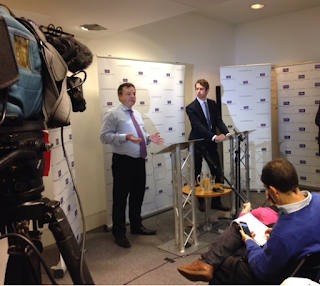Vote Leave: safest way for UK to cut costs and keep
control
The deciding factor in the forthcoming referendum on the EU
will be jobs, not immigration. That’s according to Paul Stephenson,
Communications Director and Robert Oxley, Head of Media of Vote Leave. They
told FPA members that their campaign had three core messages: cut the cost of
£350 million going to the EU every week, take back control over the UK economy
and public services, and vote for the safer choice for the future.
The two
spokesmen agreed that the Leave and Remain campaigns were currently
neck-and-neck, but leave voters were much more enthusiastic about the
referendum than those who wanted to stay. The key battleground was over “the
crucial fifth”, the 20% of the electorate who would probably like to leave the
EU but might still vote to stay because of fears about jobs. They said Downing
Street was clearly behind the stay campaign and their betting was on a September
2016 date.
The two men said Vote Leave needed to win three key battles: don’t believe
the scare stories, realise the EU isn’t working properly and understand that
things will be better if we leave. They thought the Britain Stronger in Europe
campaign (BSE) was facing some key challenges. It was a disunited coalition of
Blairites and Government, its “Project Fear” had been undermined by Stuart Rose
saying that “nothing would change if we left the EU.” And finally, BSE lacked a
clear message. The two said the later
the date of the vote, the more likely Vote Leave was to win the day.
 With six weeks to go until David Cameron's renegotiation demands are formally discussed at the European Commission in Brussels, the FPA hosted a debate between Aaron Banks of Leave.Eu and Will Straw of Britain Stronger in Europe.
With six weeks to go until David Cameron's renegotiation demands are formally discussed at the European Commission in Brussels, the FPA hosted a debate between Aaron Banks of Leave.Eu and Will Straw of Britain Stronger in Europe.

